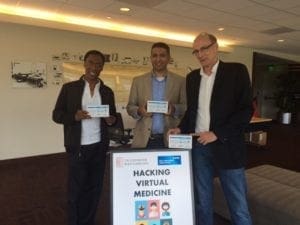 University of Southern California (USC)’s Keck School of Medicine and Institute for Creative Technologies, with participants from a variety of locations on and off the USC campus, joined forces with IEEE Standards Association (IEEE SA) for a two-day hackathon called “Hacking Virtual Medicine,” the results of which will be announced at the USC Body Computing Conference on 9 October. The grand-prize winner will receive $10,000.
University of Southern California (USC)’s Keck School of Medicine and Institute for Creative Technologies, with participants from a variety of locations on and off the USC campus, joined forces with IEEE Standards Association (IEEE SA) for a two-day hackathon called “Hacking Virtual Medicine,” the results of which will be announced at the USC Body Computing Conference on 9 October. The grand-prize winner will receive $10,000.
The IEEE SA co-sponsored the event with USC, and two companies pushing the boundaries of healthcare-related data—Dr. Evidence and Akido Labs–contributed their data and valuable expertise.
Hackathon participants were given customized Google Cardboard Virtual-Reality (VR) viewers, world-class mentoring by the VR and advanced-technology pioneers at ICT, and the mission to employ VR technology to advance healthcare in a meaningful way.
Six teams set up camp (some overnight) at ICT headquarters in Playa Vista, the “Silicon Beach” neighborhood that is the former home of Hughes Aircraft and the famous “Spruce Goose” and is now a hotbed of major tech companies and cutting-edge startups.
Arguably, VR could radically affect a broad spectrum of human endeavors in a positive way, and few human endeavors are as important as healthcare and medicine. Health is the platform on which all else happens. So it’s not surprising that the hackathon participants — both the hackers themselves and the supporting personnel — were passionate, driven, and informed. Although the winner hasn’t yet been announced, all the teams did impressive, meaningful, and inventive work that suggests some of the many ways VR could transform healthcare.
Key participants were Julie Berkley and Leslie Saxon, M.D., from Keck and the USC Body Computing Center, Todd Richmond from ICT, and the Akido and Dr. Evidence experts in attendance. Jay Iorio and Lloyd Green represented IEEE Standards Association.
The IEEE SA is looking forward to expanding its relationship over the coming years with this interdisciplinary community, a group that is spearheading major advances by employing VR to enhance quality of life, doctor-patient interaction, and general health and happiness.
For more information on AR standards, visit tandards.ieee.org/initiatives/ar/index.html.

